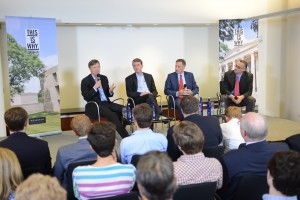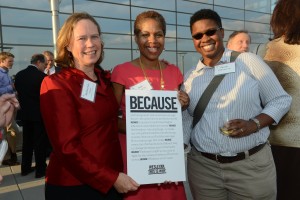This week I’ve been in the Washington D.C. area for meetings with colleagues and alumni. The trip started out with a talk to the Annapolis Group, an organization of liberal arts colleges from across the country. I’d been invited to participate in a session devoted to teaching MOOCs, and I shared the podium with Andrew Shennan, Provost at Wellesley College. Andrew knows Wesleyan well, as he was part of our visiting team during the accreditation process. He spoke about the investment that Wellesley has made in EDx, and the long process that his campus is still going through to develop classes, produce them and share them through the platform started by Harvard and MIT. I’m sure their four classes will be interesting, and I look forward to seeing them in the coming year.
I spoke more about the experience of teaching a MOOC, and the surprises that came from working with very different kinds of students from around the world. I explained that I saw our large online classes neither as a quick revenue stream nor as a threat to the model of residential learning. The courses for now are free, and we don’t yet know how exactly they will be monetized. That’s why we are keeping our investment in MOOCs very modest, financially speaking. But we are learning a lot about teaching in a different medium and about how to communicate what liberal education is all about to students from around the globe. This will inform our work back on campus.
I explained to my liberal arts college colleagues that rather than seeing MOOCs as a threat to what we do, I see many of them as showing an appetite for the kind of broad, contextual learning that we prize. It was clear from many of the discussion boards for the Wesleyan classes on Coursera that students were learning for its own sake, and that they saw these courses as opportunities to broaden their intellectual horizons and connect with other people around the world who might have similar interests. There is no way that the experience of these online classes replicates the campus experience. The dynamic synergies of campus learning in a small residential setting are uniquely powerful. The online experience is quite different, but it, too, can provide a context of learning that is compelling for many students who otherwise would never have an opportunity for this kind of education. Through our Coursera classes, Wesleyan faculty have been able to share some of what we’ve learned on campus with an extraordinarily large and diverse audience. The appetite for liberal education is much deeper and broader than many of us had imagined!
Last night I moderated a conversation with three Wes alumni who exemplify many of the virtues of liberal education. Governors Peter Shumlin (Vermont) and John Hickenlooper (Colorado) and U.S. Senator Michael Bennet (Colorado) joined more than 150 Wesleyans in a campaign kick-off event in Washington, D.C. We spoke about the joys of public service and also about the frustrations of gridlock. Education was high on our list of issues to be addressed, and we also fielded questions from the audience concerning climate change, poverty, gender, money in politics, and the challenges of compromise in an age of hyper-partisanship.
There were several current students in the audience, as well as alumni from the last six decades. We all reconnected with old friends and made some new ones. We raised money for scholarships and reminded one another that Wesleyan’s progressive liberal arts education should inspire us to take on the most pressing issues in the public sphere.
THIS IS WHY.




